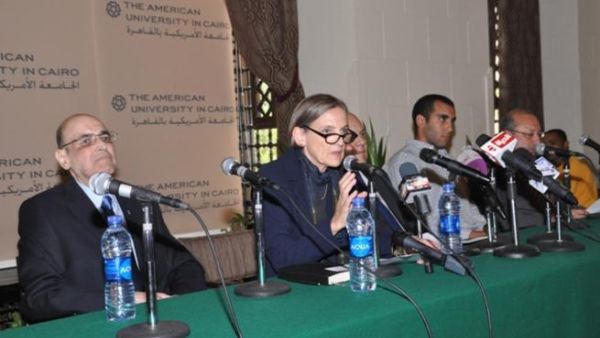AUC agreement specifies tuition cap; Administrative and academic reforms

On September 30, 2012, an agreement was signed between the AUC administration and the Student Union, ending the weeklong lockout at the New Cairo campus and beginning the resumption of normal operations at the University. “Congratulations to the entire AUC community,” said AUC Provost Medhat Haroun. “I am quite sure that AUC will be a better place as we digest the lessons learned and work together to implement the terms of the agreement.”
The agreement covers several key areas, including student participation in administration committees; planning and budgeting; registration and class size; campus services; governance and administrative reform; and disciplinary action. One of the most contentious issues of discussion was the 7 percent increase in this year’s tuition fees. As a result of the agreement, tuition increases have been capped at 2.3 percent annually until the fiscal year 2016. All current students may pay their tuition fees in three interest-free installments per semester.
Current students requiring financial aid will also be eligible to apply at regular intervals throughout the year. The eligibility criteria for achievement scholarships will be reviewed to ensure that they are clear and justifiable. In addition, the general elements of the University’s total annual budget will be made public and easily accessible to the AUC community.
To ensure that student voices are properly represented in key administrative committees, the Standing Budget Committee, which will develop strategies to achieve and maintain a balanced budget for the University as well as reduce reliance on tuition and ensure that the quality of service is maintained, will include a minimum of five students, of whom at least two would be accounting, finance or economics majors. In addition, students who take part in administrative committees resulting from this agreement will be recognized at the end of each academic year, and their positions may be considered as internships or as part of the work-study program. “The administration considers our students key stakeholders in University life, and we welcome and encourage their participation,” said AUC President Lisa Anderson. “The opportunity for our students to take part in University life is central to our commitment to a liberal arts education and to ensuring that they become engaged and responsible citizens. Students have an important role to play in helping us make AUC better.”
All committees will have access to University data and will be given administrative support. Committees established or restructured through the agreement will keep the AUC community regularly informed of recent updates, which will be presented to the University’s Board of Trustees. The president will also establish a standing advisory committee made up of alumni, faculty and the Parents Association. This committee will provide advice and counsel to the president on University operations, including proposed budget cuts, governance reform and community relations. The provost will also establish an advisory committee, working in coordination with the Senate Grievance Committee, to handle major grievances relating to faculty members.
In addition to administrative committees, increasing student representation in the University Senate will also be considered, both on specified committees and in the allocated at-large seats, up to 10 additional members. The senate will also be urged to assess the current system of student evaluations of faculty and courses, coming up with new proposals by mid-November. Academic departments, on the other hand, will be encouraged to establish student associations, whose representatives would be invited to attend departmental meetings, as appropriate. Working with the Office of the Provost, departments should also seek student input on candidates for faculty positions.
In terms of courses, the provost will launch a new registration process this semester, which includes devising a four-year graduation plan and strengthening academic advising. To maintain an appropriate faculty-to-student ratio, the provost will establish a committee to determine appropriate class sizes for different programs and levels of study.
In order to guarantee and maintain holistic administrative reform, the president will establish a task force to examine areas within the University that may not be performing well. This task force will be made up of students, alumni, faculty, staff and the administration, as well as members of the Parents Association.
Finally, there will be no impunity for students who participated in the strike. Cases that are currently being reviewed by the Student Disciplinary Committee will be ended, and a Special University Tribunal will be established to consider accusations of violation of University policy by any AUC community member. The mandate and composition of the tribunal, which will include faculty, staff, students, alumni, members of the Parents Association and the administration, will be announced by October 4, and it will start work the following week. “We, as students and administration, are dedicated to the continuing improvement of the University, in order to realize our aspiration to be, and to be recognized as, one of the best universities in the world,” said Anderson.
Background Information
American University of Cairo
Founded in 1919, AUC is a leading English-language, American-accredited institution of higher education and center of intellectual, social and cultural life of the Arab world. Its community of students, parents, faculty and staff, trustees, alumni and other generous sponsors represent more than 60 countries. The University stands as a crossroads for the world’s cultures and a vibrant forum for reasoned argument, spirited debate and understanding across the diversity of languages, facilities and human experiences.






